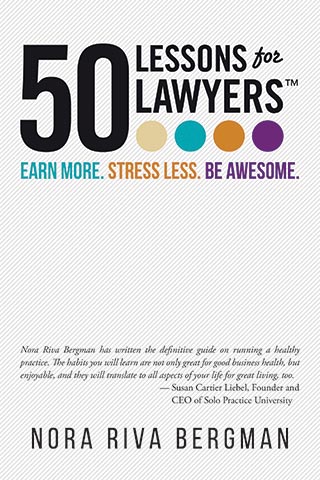How we spend our days is, of course, how we spend our lives.
– Annie Dillard
 How are you spending your days? If you’re like most lawyers, you’re too busy putting out fires to worry about how you’re spending your days. You’re too busy paying the bills. You’re too busy dealing with staff. You’re too busy arguing with opposing counsel – or sometimes, your clients.
How are you spending your days? If you’re like most lawyers, you’re too busy putting out fires to worry about how you’re spending your days. You’re too busy paying the bills. You’re too busy dealing with staff. You’re too busy arguing with opposing counsel – or sometimes, your clients.
But then something happens: A loved one dies unexpectedly, or perhaps you’re diagnosed with a serious illness. Everything changes. It often takes a life crisis to wake us up and force us to examine how we’re spending our days. I think of these times in our lives as ampersands: Before the event & after the event. Everything changes after the ampersand. There is the “before” & “after.”
Maybe you’ve lived through ampersands that have forced you to change some aspect of your life. But most of us don’t have ampersands that force us to change our working behavior. Instead, too many lawyers are stuck in work, work, work mode, unaware of what’s going on around them. Or we attempt to change time after time, with little success. We walk into the office on any given Monday morning and say, “Today will be different!” And yet it never is. But today can be different. And since you’re here, reading this now, I think you know it can be different. The good news is that you’re right. You can change your life for the better – one step at a time. One lesson at a time.
My vision is that each one of these 50 Lessons will be an ampersand for you. The 50 lessons that follow focus on skills to develop, habits to create (and habits to extinguish), and strategies that simply are not taught in law school. My hope for you is that you don’t just read the 50 Lessons. My hope is that you live them. By living the 50 Lessons, you’ll be able to create a law practice that serves your life, rather than living a life that serves your law practice. Let’s get started.
If today were the last day of your life, would you want to do what you are about to do today?
– Steve Jobs
This first lesson is the most important lesson, because if you don’t realize that this is your life and begin taking control of it, your life will live you. Start by getting very clear about what you want from your life – both personally and professionally. Write your thoughts down. Call it a “Mission Statement” or a “Vision Statement” or “My Manifesto.” Call it whatever you like. It doesn’t matter WHAT you call it. What matters is that you KNOW what you want. What matters is that you KNOW why you do what you do. I would suggest creating a personal mission first, then creating a professional mission. Your law practice should serve your life, not the other way around.
A year from now, you may wish you had started today.
– Karen Lamb
Without clear understanding of what you want from your life, both personally and professionally, you will forever be living your life by default, rather than by design. In the business classic, The 7 Habits of Highly Effective People,[1:1] Stephen Covey talks about the importance of seeing the “big picture” of your life as a starting point against which all of your actions are measured. He refers to this as “beginning with the end in mind.”
To begin with the end in mind means to start with a clear understanding of your destination. It means to know where you’re going so that you better understand where you are now and so that the steps you take are always in the right direction.
– From The 7 Habits of Highly Effective People
Your mission is the compass that keeps you moving in the right direction. That is why it is the focus of this first lesson. Your mission statement doesn’t need to be lengthy. In fact, the shorter the better. Think of your mission statement like the United States Constitution. It is the document against which all of your actions are measured. And remember, simplicity is an asset. There are only 272 words in the Gettysburg Address.
When you have a clear mission for your life, it will become the means by which you determine how you “spend your days” and in turn, how you spend your life.
Write down on paper your goal in life. You cannot find happiness until your goal is clear and in view.
– Ross Byron
Living the Lesson
- Create a mission statement for both your personal life and your professional life.
- Start by creating your personal mission. Your personal mission should drive your professional mission – not the other way around.
- Set aside a few hours and go somewhere where you can focus and not be distracted. Bring pen and paper or a tablet or iPad – whatever works for you. For help getting started and to view sample mission statements, go to: www.missionstatements.com.
- After creating your personal mission, use it as a guide to inform your professional mission. Writing your personal mission will help you discover those things that are most important to you. Use what you discover as the starting point for your professional mission.
- If you run your own law firm, you should create a mission statement for your firm in the same way you created your personal and professional mission statements.
- Keep copies of your mission statements close by. Keep your personal mission on a card in your wallet or on your phone. Keep your professional mission on your desk in your office where you can see it every day. Display your firm’s mission on your website and in your reception area so that it can serve as a source of motivation for you and your staff, and as a source of inspiration for your clients.
20 years from now you will be more disappointed by the things you didn’t do than by the ones you did. So throw off the bowlines. Sail away from the safe harbor. Catch the trade winds in your sails. Explore. Dream. Discover.
– Mark Twain
[1:1] Covey, Stephen R. (1989, 2004). The 7 Habits of Highly Effective People. Simon & Schuster.
Order 50 Lessons for Lawyers on Amazon.com ›

